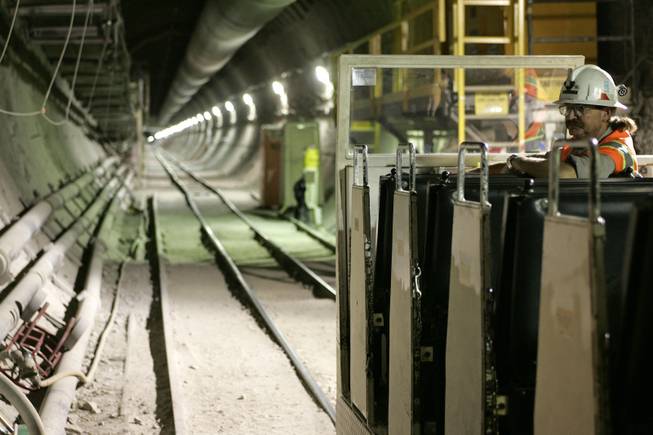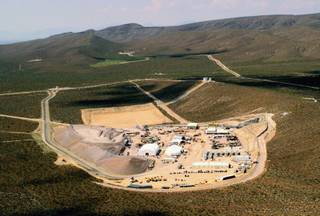
SUN FILE PHOTO
A train operator waits for passengers at the Yucca Mountain Exploratory Studies Facility in 2006.
Friday, Sept. 17, 2010 | 9:53 a.m.
Sun Archives
Sun Coverage
Yucca Mountain appears to be getting a reprieve this week after the country’s chief nuclear regulatory agency said radioactive waste can be safely stored on-site at reactors for decades longer than previously thought.
The Nuclear Regulatory Commission quietly amended the Waste Confidence Rule – the instrument that forms the basis of rules on disposing spent nuclear fuel – to read that waste from nuclear reactors can be stored on-site for at least 60 years after a plant’s license expires, and before it must be transferred to a permanent disposal site.
That’s nearly twice as long as the rule previously dictated, and the change relieves enormous amounts of pressure on Yucca Mountain, which remains the primary target site for large-scale disposal of nuclear waste, despite efforts from Nevadans on up to the Obama administration to keep the project off the table.
Last year, Department of Energy Secretary Steven Chu attempted to pull the plug on the official petition to make Yucca the country’s chief site for nuclear waste disposal – but the Commission ruled it could not do so. That decision by the Commission’s licensing board has been appealed to the ruling board, which has yet to issue a final judgment.
The focus on Yucca began in 1982, when Congress passed the Nuclear Waste Policy Act, which instructed the Department of Energy to file the application to make Yucca a disposal site – an application that the Energy Department was prohibited from withdrawing without Congress’ express approval under the same statute.
Some groups saw the mountain dump site as on opportunity to bring increased revenues to Nevada. But several more – as much concerned about the potential for disastrous accidents in the transport of radioactive materials as the dangers of storing such byproducts only 90 miles from Las Vegas – have been fighting the designation ever since.
While the Commission’s Wednesday rule change didn’t address Yucca specifically, to many Nevadans, the significance of the rollback was clear.
“This is one more step that must be taken in order to replace the broken policy we now have that has targeted Nevada as a nuclear garbage dump for the past three decades,” said Rep. Shelley Berkley, D-Las Vegas. “Nevadans have been saying for years that nuclear waste can safely be stored at existing sites for the next 100 years, and this new NRC ruling proves that it can be done safely.”
The year 2020 has been looming as an improbable, but nonetheless semi-official target date for when Yucca was supposed to open as a nuclear repository. The date was selected to ensure that there would be a repository not just for existing waste from existing sites, but for any new waste produced from newly approved reactors. Licenses are normally issued for a period of about 20 years, and then re-licensed for another 20 – but no new reactors have been licensed or built in a long time because the disposal system was in limbo.
“New reactors can’t be licensed unless there is confidence that the spent fuel will be disposed of,” said Joe Strolin, planning adviser with the Nevada State Agency for Nuclear Projects. “That’s the reason for this ruling.”
By replacing all hints of time targets with the confidence that a “sufficient repository capacity will be available when necessary” for nuclear waste, the Commission freed itself to approve new nuclear power plant petitions, along with allowing the industry and government some breathing room on finding a permanent waste-disposal solution.
Many are hopeful that the rule change will also afford nuclear scientists and technicians the time necessary to develop “safer and more secure alternatives to the deadly Yucca Mountain project,” said Tom Brede, a spokesman for Senate Majority Leader Harry Reid, who has been a leading voice against the use of Yucca as a nuclear waste repository, advocating it be preserved for a number of alternate uses instead -- including testing renewable energy technology.


Join the Discussion:
Check this out for a full explanation of our conversion to the LiveFyre commenting system and instructions on how to sign up for an account.
Full comments policy